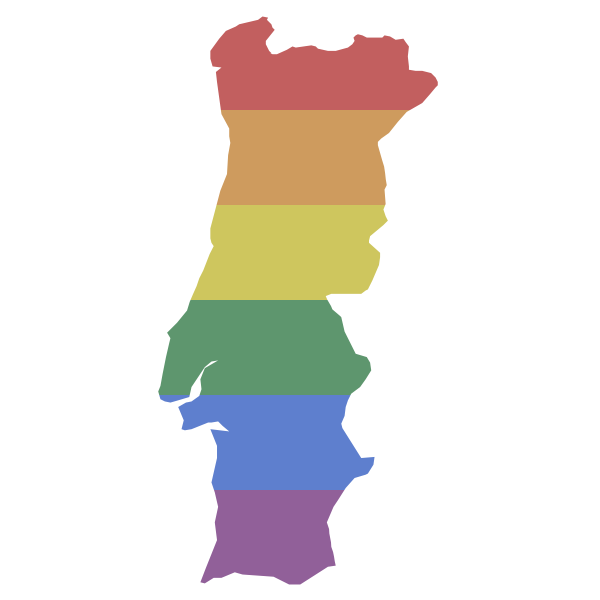- Homosexuality
- ⚢✔ Legal
- Gay Marriage
- ⚭✔ Legal
- Censorship
- ✔ No censorship
- Changing Gender
- ✔ Legal, no restrictions
- Gender-Affirming Care
- ✔ Legal
- Non-Binary Gender Recognition
- ✖ Not legally recognized
- Hate Crime Protections
- ✔ Sexual orientation and gender identity
- Discrimination
- ✔ Illegal
- Employment Discrimination
- ✔ Sexual orientation and gender identity
- Housing Discrimination
- ✔ Sexual orientation and gender identity
- Adoption
- ✔ Legal
- Intersex Infant Surgery
- ✔ Full ban
- Military
- ✔ Legal
- Donating Blood
- ✔ Legal
- Conversion Therapy
- ✔ Banned
- Age of Consent
- ✔ Equal
Public Opinion
Surveys in Portugal have shown mixed views towards LGBTQ+ rights and issues.
Perception of LGBTQ+ People
Survey results from 18 LGBTQ+ Equaldex users who lived in or visited Portugal.
Overall
Perceived Safety**Survey results represent personal perceptions of safety and may not be indicative of current actual conditions.
Equal Treatment
Visibility & Representation
Culture
Services
History
Homosexual activity in Portugal is legal.
On 23 September 1982, Parliament approved a new Penal Code, which removed provisions criminalizing consensual same-sex relations between adults. The reform took effect on 1 January 1983, finally ending Portugal’s legal persecution of homosexuality.
With the Estado Novo’s rise, repression intensified. In 1936, Decree-Law No. 26 643 created the “state of delinquency,” which allowed the authorities to punish homosexual behavior even without a proven criminal act. Special detention centers and labor colonies were established, with sentences ranging from one to six years. During the 1940s and 1950s, police surveillance intensified, targeting cruising areas in public spaces, and arrests were socially selective, focusing on lower-class individuals while elites often escaped scrutiny.
The 1954 Penal Code (Decree-Law No. 39 688) explicitly criminalized homosexuality, applying “security measures” such as confinement in asylums or labor houses and probation. Over 12,000 people were admitted to such institutions between 1933 and 1951. Political repression also leveraged these laws; for example, in 1962, the politician Júlio Fogaça was convicted for homosexual conduct. Despite some softening of social surveillance in the late 1960s, repression continued until the dictatorship’s fall.
The Estado Novo ended with the Carnation Revolution on 25 April 1974, which brought an immediate decline in political policing of LGBT people. However, the legal framework criminalizing homosexuality remained until 1982. The Penal Code reform, effective in January 1983, finally decriminalized consensual same-sex relations between adults in private, marking the official end of Estado Novo-era legal repression.
Censorship of LGBT issues in Portugal is no censorship.
Right to change legal gender in Portugal is legal, no restrictions.
Legal recognition of non-binary gender in Portugal is not legally recognized.
Hate crime protections in Portugal is sexual orientation and gender identity.
Article 132 – Aggravated Murder
1. When death is produced under circumstances that reveal a special reprehensibility or perversity, the offender shall be punished with imprisonment from 12 to 25 years.
2. The following circumstances reveal the special reprehensibility or perversity that is referred to in the previous paragraph, namely, the circumstance that the agent:
(...)
(f) is determined by racial, religious, political hatred or based on the victim’s colour, ethnic or national origin, sex, sexual orientation or gender identity;
(...)
LGBT employment discrimination in Portugal is sexual orientation and gender identity.
LGBT housing discrimination in Portugal is sexual orientation and gender identity.
Same-sex adoption in Portugal is legal.
Serving openly in military in Portugal is legal.
Trans people aren't explicitly banned from joining the army, but due to discrimination and regulations that also apply to cis people, but more commonly affect trans people, they are unable to join.
Blood donations by MSMs in Portugal is legal.
Conversion therapy in Portugal is banned.
Additionally, a bill that bans conversion therapy was passed by the parliament on December 21st, 2023. It was signed by the President a few weeks later and took effect on March 1st, 2024.
Equal age of consent in Portugal is equal.
LGBT Rights by District
View the LGBT laws in each individual district of Portugal.
- Viana do Castelo
- Vila Real
- Viseu
- Évora
- Região Autónoma da Madeira (Autonomous Region)
- Região Autónoma dos Açores (Autonomous Region)
















